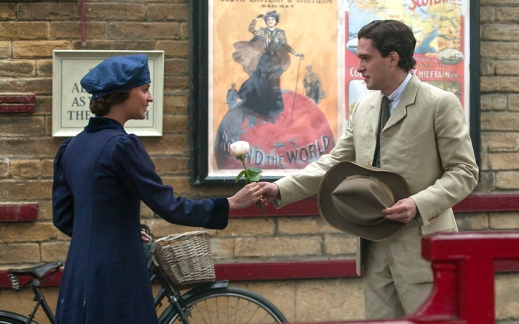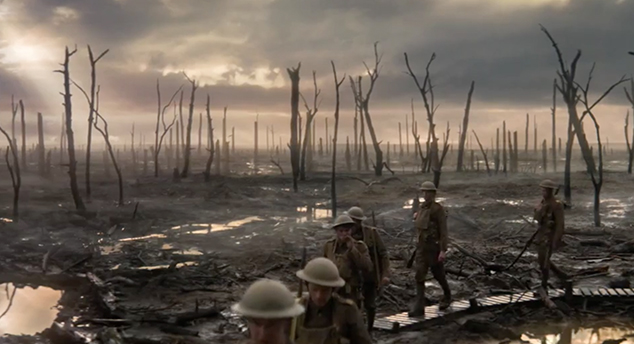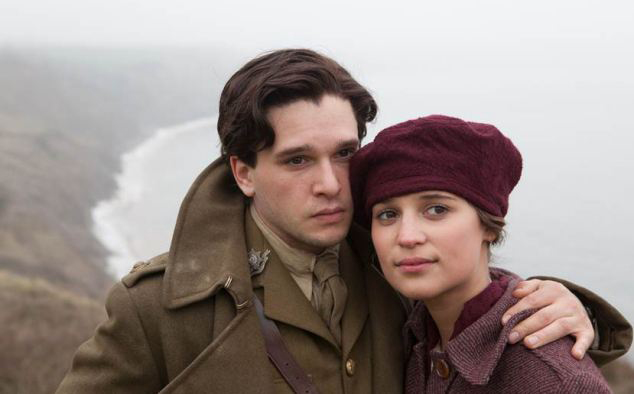
United Kingdom | 16 January 2015 | Directed by James Kent | Written by Juliette Towhidi | Starring: Alicia Vikander, Kit Harrington, Dominic West, Emily Watson, Taron Egerton, Hayley Atwell, Colin Morgan
In November last year, on Remembrance day, Britain honoured those who had sacrificed their lives for the good of the nation, as it does every year. However, as 2014 marked the 100th year anniversary of the beginning of the First World War the single day of commemoration turned into an entire week as special services were held all over the country and countless stories were shared through the media.
This perhaps made it even more appropriate that the Bath Film Festival, which began a few days after Remembrance Sunday, had scheduled a preview showing of the new BBC Films production, Testament of Youth, a WW1 drama based on Vera Brittain’s renowned autobiography of the same name. As if in the spirit of Remembrance, the entire film revolves around the concept of memories, from the storyline itself to the effect created by the beautiful cinematography and editing.
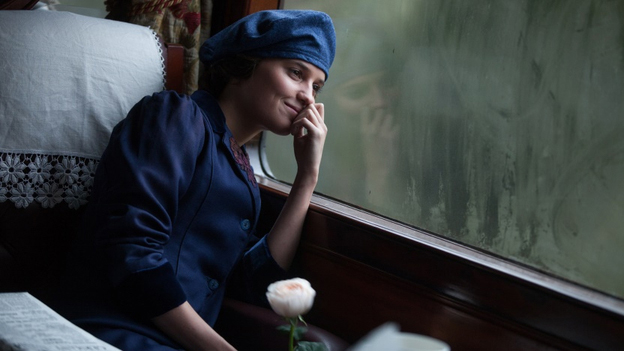
This debut feature from director James Kent, tells the true story of Vera Brittain, who as a young woman (and like many others at the time) had here life, love and future stripped from her with the beginning of the First World War. From the offset, we learn that Vera – played by promising newcomer Alicia Vikander – is not destined to follow the conventions of early Twentieth century womanhood. Her unsurprisingly restrictive and patronising parents (Dominic West and Emily Watson) expect their daughter to aspire to be a worthy housewife to a successful gentleman, yet Vera dares to achieve her own successes by following her brother Edward (Taron Egerton) and his friends to Oxford University.
All of Ed’s buddies are of course in love with his sister, one of which is Roland Leighton, played by Kit Harrington, who you may recognise as man who plays Jon Snow in Game of Thrones. However, unlike Harrington’s mopey TV character, Roland is a confident, charismatic young chap who Vera, after some initial resistance from countless flirtations, inevitably falls for. Sadly, contestant no.2 Victor, played by Colin Morgan (star of BBC’s Merlin), is destined to be the third wheel, how ever hard he tries. It’s all fun and games for some time, and the universal response to the news of conflict overseas is that it’ll all just blow over. However, this soon changes; suddenly and drastically.
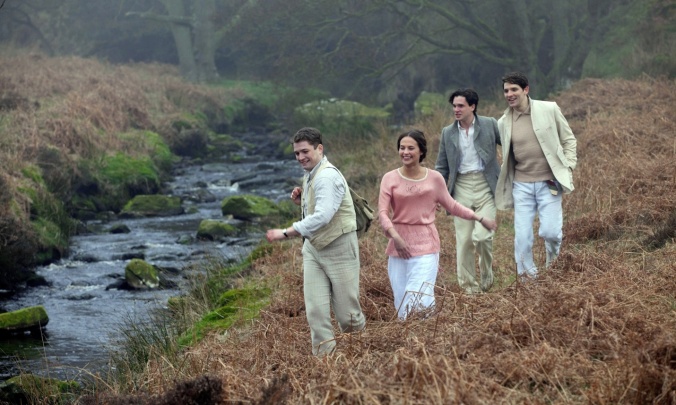
Kent and writer Juliette Towhidi do a superb job of conveying the huge range of emotions that people would have experienced when the war broke out. Namely, the confusion of how the war had started and why families were seeing their loved ones whisked off to a foreign land when there was no domestic threat; as well as the sheer despair of seeing someone leave, being continuously reassured that they will return, yet knowing that this promise most probably will not be fulfilled.
Perhaps the most surprising of emotions, shown by the soldiers themselves, was the excitement and uncontrollable thirst for adventure that encouraged them to enlist. Our intrepid trio aren’t afraid of war at all, instead they are drawn to it and see it as something they must do at all costs, even if it costs their lives. Initially, this comes across as some kind of boyish naivety and when Edward, Roland and Victor return to British soil for a temporary ‘break’ from battle, it is clear that the realities of war have affected their eager attitude. However, their determination to continuously return to the War shows that the men of that era simply had an unfathomable amount of courage, loyalty and honour. They had been to war, they had seen the horrors, they knew that the cause was meaningless; yet they fought anyway.
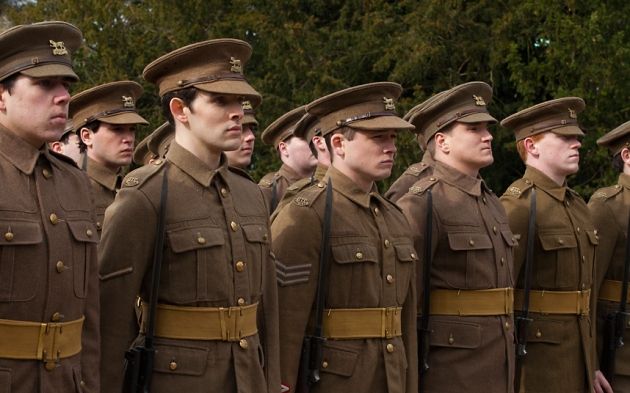
Testament of Youth is not your conventional war film. Whilst most rely on extravagent and frequently horrifying action sequences to present the atrocities of war, Kent’s film delves deeper into the psychological wounds not only of the soldiers but of the rest of society. Throughout the story we remain solely in Vera’s shoes and it is a very telling perspective. The soldiers come and go, leaving the audience to simply imagine what they are going through. As Vera continues with normal life at home, the scenes are interspersed with clips of Roland and the other boys. These images aren’t memories of real moments but more constructed fantasies that work effectively to typify Vera’s constant, uncontrollable worry and profound love for her friends and family. It is the fact that her loved ones are in constant peril and that she completely unable to help them that drives her and the audience to the edge.
The film shows how life in Britain was virtually unaffected; how people were able to carry on with their lives as if there was no war at all. The only difference is the absence of men, leaving the scenes noticeably silent, as the women drift through life preoccupied by the thoughts of their missing sons, brothers, and husbands. It seems that this was all women could do, wait in desperation for some kind of communication that confirmed their loved one was still alive. When the dreaded news finally does come, it is in the form of a blunt knock at the door and an description of how your friend/sibling/lover was killed instantly whilst climbing out of a trench.
There is no heroised Hollywood moment of a soldier taking down a dozen enemies before being shot himself, falling into his comrade’s arms and delivering one last passionate speech that will be quoted for years to come. There is only demise in its most brutal and realistic form, dwelling on the futility and abruptness of the deaths of soldiers. However, these themes are presented without a single bullet being fired, as the film gives its focus to the state of the men before and the state of them after, either physically or mentally wounded, or simply vanished entirely.

Being the determined, heroic woman she is, Vera decides that she cannot sit around like other women waiting for the inevitable bad news, and so she abandons her Oxford education to be become a battlefield nurse. Whilst a film like Saving Private Ryan depicts the shocking realisation of how wartime massacres unfolded, Testament of Youth shows where the slaughtered victims ended up, giving a horrifying ‘behind-the-scenes’ perspective, as it were, appropriate for pretty much any movie battle sequence you’ve ever seen. What Vera’s nursing experiences reveal in particular, is how particularly devastating the First World War was in terms of casualties. Unlike the comparatively tactical and varied combat of WW2, the trench warfare of WW1 simply consisted of one mass execution after another, and the audience experiences this first-hand following Vera’s helpless attempts to save thousands of dying soldiers.
The film features some gloriously emotive performances, from seasoned veterans like Dominic West, Miranda Richardson and Emily Watson, but more notably from the youth. Kit Harrington, Taron Egerton and Colin Morgan play such likeable characters that it is agonising to see the War tear their lives apart. However, it is our Vera who steals the show, as we go through every heart-wrenching moment with her, seeing her thoughts and feeling her pain. Alicia Vikander, the Swedish-born actress who stars in Ex Machina later this month and a host of other films to be released this year, delivers a truly inspired performance from start to finish and she surely has a hugely successful career ahead.

If this film deserves any criticism, it would be that, as a whole, it weighs too heavily towards pathos. Sure, this is a drama about the culling of a generation and Kent succeeds at embedding a potent sense of loss that is truly affecting. Yet as an audience we are subject to horror after horror and the film descends slowly into sorrow and heartache until a resurgent ending where Vera’s newly-developed, radical ideas are finally brought to the fore. Vikander’s performance is undoubtedly beautiful, but the film would have delivered a more influential message had Towhidi gave greater emphasis to the inspiring pacifism that Vera Brittain devoted her life to as a result of the war.
Testament of Youth succeeds at displaying the sadness, but fails at presenting the inherent anger that encouraged Brittain to write her novel and become the ‘voice’ of a lost generation. Vikander does make one moving speech that attacks the misconception that these men died for some greater meaning, explaining that the fact they died for nothing, in turn, gives them meaning; the meaning that war and violence are completely futile. However, it is almost as if the film ends as the real, vengeful Vera has been released; the one who we all (after an hour and a half of perpetual misery) are dying to see. Nonetheless, this is a truly stirring and important film that in the light of remembrance should be seen by all; an almost perfect testament to the lost youth of one of the most devastating events in human history.
